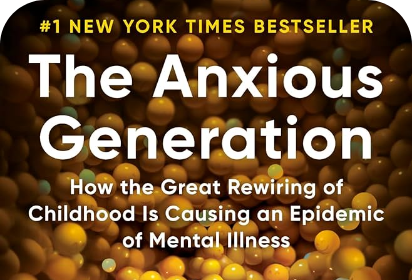
Quick disclaimer – I started writing this article weeks ago, tabled it, and I just came across it again. Given that May is Mental Health Awareness Month, I thought it time to share. I know that this piece may seem a little off-topic from my more typical college planning advice, but I promise it’s not. So, please stick with me ’til the end and I promise I’ll step down from my proverbial soap box.
Anyhow, about a year ago I made a commitment to regularly remind my students about the importance of reading. Books, that is. NOT social media or their newsfeed on their mobile devices, but actual books (they could be eBooks or even audiobooks). I’ve become pretty adept at working, “What are you reading right now?” into most of my meetings with my students.
There are a number of reasons I want my students to develop an appetite for reading, and yes, many of them have to do with college (a proven link between reading and improved standardized test scores, the ability to craft a well-written, compelling narrative, conduct a conversation with an adult/admissions representative, facilitate independent performance in rigorous courses, etc.). But…there is more. To me, books, even those that don’t contain pointedly relevant material, are the impetus for ideas, can spark creativity, and improve articulation. Even the most obscure graphic novel can offer overt instructions for overcoming life’s obstacles.
So, I like books – to give them and receive them. And I just finished a really great one which has made me double down on my insistence that my students get to a library and start reading. Like right now and definitely, this summer!
It’s called The Anxious Generation, and it’s written by NYU professor Jonathan Haidt. It is both frightening and insightful, and frankly a must-read (imho) for every parent, educator, counselor and psychologist. Even students will find this book to be of interest, even if they may resist its recommendations.
It’s called The Anxious Generation, and it’s written by NYU professor Jonathan Haidt. It is both frightening and insightful, and frankly a must-read (imho) for every parent, educator, counselor and psychologist. Even students will find this book to be of interest, even if they may resist its recommendations.
The book examines the increase in anxiety and depression among Gen Z, or those born after 1995. This is the first generation to grow up in a world of social media and smart phones, or a phone-centric world, and the impact is, well, depressing. Reported rates of anxiety and depression rose remarkably between 2010 and 2015 (and continue), or the years that social media apps grew in popularity and use on smart devices. Haidt makes a number of interesting points, among them that we are very overprotective of our children in the real world, but extremely under-protective in the virtual world. We are super nervous about allowing our kids to leave the house alone, walk or ride to the corner store by themselves, or even engage in unstructured play out of fear that they will be approached by a predator, abducted, or find themselves in an uncontrolled, chaotic activity where grownups are not around to set the rules. Yet online, we give our kids full rein to access well, anything…extremism, hate, bullying, pornography, etc. And this exposure happens when our teens are not fully formed and their decision-making ability is inchoate at best. COVID only exacerbated this, and cobbled together, it all leads to more fear, anxiety and depression, low self-esteem, and a reduction in taking proper risks that can lead to growth.
I’m worried about our kids. So I’m thrilled when I hear an enthusiastic response to my question about reading, especially when that response includes not only a title (and author) but also a brief synopsis of what the book is about. Little tidbit – I usually go and read what they’re talking about and wind up having an ongoing, albeit small, book club with some of my students. On their recommendations (and on my own) I’ve read All the Light We Cannot See by Anthony Doerr, Alexander Hamilton by Ron Chernow, Benjamin Franklin by Walter Isaacson, American Dirt by Jeanine Cummins, My Effin’ Life by Geddy Lee, Poison Ivy by Evan Mandery, The Alchemist by Paulo Coelho among several others.
That said, the response I hear more often from students is, “Oh, I’m not reading anything right now”, followed by an excuse or rationalization such as “I have so much schoolwork to do”, or “I don’t have time with my busy schedule.”
In 17+ years of counseling students I find that those kids who continue reading through high school are the ones who have the most success when it comes to competitive college admissions. I’m not saying kids need to read a book every month if they want to get into college, but on the most selective side of the admissions process, the readers are those who enjoy the most success.
For some kids who are overscheduled and overworked, I reluctantly accept that answer. For now. But once summer hits, I start calling bull$h!t and I’m going to start asking them how much time they spend on social media, watching Netflix or playing video games.
Facts (for those sick of my opinion): kids who read more tend to outperform their peers on the SAT or ACT, which are mostly reading tests; their advanced skill and practice with words tends to make them more expressive and hence better writers, which often translates to better college essays; college interviewers often ask about books that students have read recently; and when students get to college they are more likely to succeed because they are already familiar with the rigors of heavy reading, which is a tough switch to simply flip on when the academic workload increases.
So, I’m asking my students — and encourage you to do so as well — “How much time are you spending on social media or playing video games each day?”
The answers so far don’t surprise, but they do concern. A typical response is “about 3-4 hours each day”. Haidt makes some good recommendations about how to reduce that…and I’m happy to discuss his suggestions with you privately. But returning to my main point – I’m trying my best to encourage my students to rekindle their interest in reading. I’m convinced that this activity leads to so many benefits that translate into success on the college admissions front, as well as making them better thinkers and better students.
If you share that philosophy, let us know what you’re reading…and check out our growing community at Your College Concierge of like-minded college planning advisors, educators, merchandisers, and college lifestyle experts. The journey from child to adult — not to mention to and through college — can be fraught with so many challenges, but together we can make that road a far more enjoyable adventure.
Best,
Peter
Your College Concierge, Inc.
P.S. Whether your rising 12th grader is a reader or not, s/he will clearly benefit from our Summer Application Boot Camp. Click here to learn more and sign up!
P.P.S. At the risk of sounding hypocritical, follow us on Instagram @YourCollegeConcierge. Not all social media is bad!
P.P.P.S. Decision Day (May 1) came and went, and while many in the Class of 2024 have settled on a college home, many others are still awaiting financial aid offers that are delayed because of the FAFSA Fiasco. I will have more on Class of 2024 results in the week ahead.



